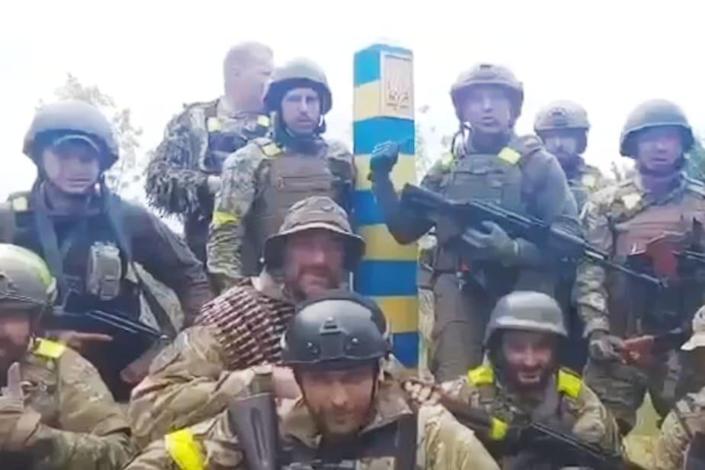The grainy video shows 12 smiling soldiers ducking into a shot around a yellow and blue marker and giving the thumbs-up.
“We have made it. We are here, Mr. President,” one of the soldiers says, addressing Ukrainian leader Volodymyr Zelenskyy.
The video, which Ukraine’s Defense Ministry shared Sunday, is most likely evidence of something once thought unthinkable: Russian forces are being driven back to their border, if not over it.


NBC News could not confirm where and when the video was shot.
Ukrainian officials said it showed territorial defense troops who had recently reached the border near the heavily bombed city of Kharkiv. A U.S. defense official confirmed Monday that Ukraine had gained ground around the city, pushing Russians to within a couple of miles of the border.
Such an advance on Russia’s western flank would have been unthinkable just a few weeks ago. But with Western military aid flowing into Ukraine and Russian troops bogged down by low morale and logistical challenges, it is the latest in a string of setbacks for Moscow and an indication that the war is still not going President Vladimir Putin’s way.
“Guys, Kharkiv,” Zelenskyy said to the troops on his Instagram account shortly after the video of the soldiers was released. “I am sending you thanks from all the Ukrainians. … My gratitude knows no borders.”
The Russian Defense Ministry did not respond to a request for comment about the video of Ukrainians reaching the border.
It is a big deal. Not only is Kharkiv close to Russia, but it is also home to many ethnic Russians and Russian speakers — the very people Putin promised to “liberate” from what he falsely claims to be Kyiv’s “Nazi” regime.
“If Russia isn’t even welcome in such an area, it really tells you something about … the multiethnic Ukrainian nation that is much more attached to Ukraine as a state than any nostalgic thought about the Soviet Union or Russia,” said Stefan Wolff, a professor of international security at the U.K.’s University of Birmingham.
The series of stumbles provided a healthy dose of reality for Putin and indicated the degree to which Russia’s campaign has backfired on him, Wolff added.
On Tuesday, Russia took control of the strategically important city of Mariupol after weeks of intense fighting. The victory runs counter to a trend of surprising Kremlin defeats and disappointments in the nearly three-month war.
“They realize that they lost a blitzkrieg,” said Alexander Baunov, a senior fellow at the Carnegie Endowment for International Peace, referring to the initial Russian offensive, which sought to capture the capital, Kyiv, and topple Zelenskyy’s government within days.
After it retreated from Kyiv, Russia said the new focus of its so-called special military operation — it refuses to call it a war — was the industrial region of Donbas. The region was already partly controlled by separatists whom Moscow has been backing for eight years. But even there it has failed to gain any substantial territory despite initial small-scale advances.


“It looks like the Russians have overextended themselves and by concentrating on the Donbas left themselves too thinly spread around Kharkiv,” said Phillips O’Brien, professor of strategic studies at the University of St. Andrews in Scotland. “Big-picture problem for Russia is that they have to protect a very large area of seized territory but might not have the soldiers to do it.”
Still, Wolff said, Russian military leaders have modified their tactics and should not be discounted.
“Russian forces are more systematic in their approach now and are trying to overwhelm Ukrainian forces in specific areas,” he said. “This does not mean that they have scaled back their overall plans, but they may be sequencing and prioritizing differently.”
In the end, he said, Ukraine stares down what will likely be a prolonged, intense and bloody battle in the Donbas. The Ukrainian military confirmed Monday that Russia continues to make advances in several areas in the region.
With everything thrown at the Donbas now, any retreat there will be hard to mask.
“The Donbas is everything. It’s the last goal that you cannot cancel,” Baunov said. “The rest you can maybe move aside or forget. But not this.”




